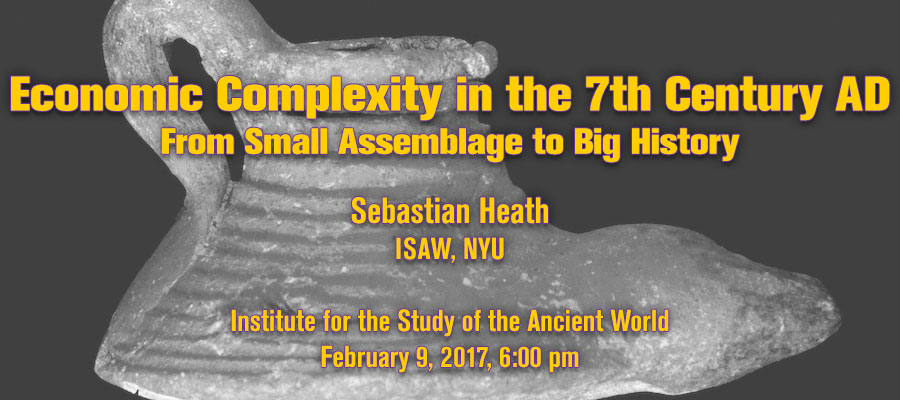Economic Complexity in the 7th Century AD: From Small Assemblage to Big History, lecture by Sebastian Heath (ISAW, NYU), Institute for the Study of the Ancient World, February 9, 2017, 6:00 pm
In this Sebastian lecture Heath will describe his work on a mid-7th century AD group of amphoras and related objects - such as stoppers and funnels - found in 1976 at Kenchreai, the Aegean port of the ancient city of Corinth. This material is now being studied by the American Excavations at Kenchreai sponsored by Vanderbilt University by permit of the Greek Ministry of Culture. Most of the amphoras are regionally produced and Heath will show how these can be easily distinguished from the many imported forms, including examples from near Cyprus and regions within ancient Palestine. The local amphoras come in two sizes as do the amphora stoppers that may have sealed them. There are at least two forms of funnel. As with many late imperial historical contexts, the Seventh Century AD in the Mediterranean was a time of turmoil and a time of ongoing economic activity. The group of amphoras and other equipment to be discussed - along with the tablewares, lamps and glass that accompanied it - can illuminate the complex human behaviors that allowed regional exports to make it as far afield as Italy, Southern Gaul and Britain. Heath will also show the work he is doing to make all the information the project is generating available on the public internet.
Sebastian Heath is Clinical Assistant Professor of Ancient Studies at the Institute for the Study of the Ancient World. He has an A.B. from Brown University in Medieval Studies and received his Ph.D. in Classical Art and Archaeology from the University of Michigan. His research interests include Roman pottery, numismatics and the role of Digital Humanities in the study of the Ancient World, including the use of 3d models in fieldwork and teaching. The focus of his work at ISAW is the role of technology in scholarly communication and publication, which includes editorial work on ISAW Papers and ISAW's born-digital books.
